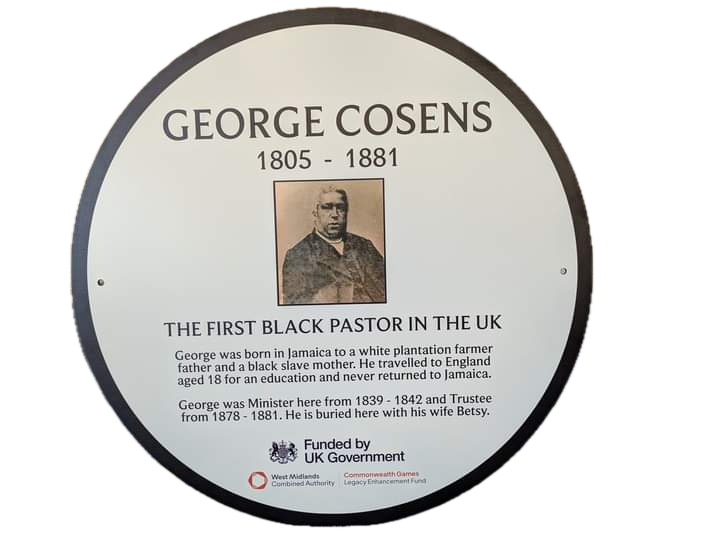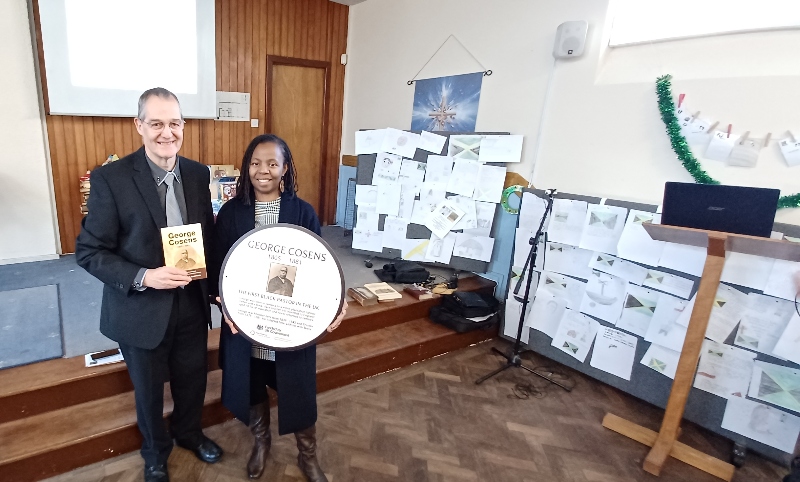Plaque to commemorate the Revd George Cosens (1805-1881) – the first known Black person to hold pastoral charge of a church in Britain
Church members, local school children, community forum members and other invited guests gathered at South Street Baptist Church, Brierley Hill, for the unveiling of a plaque commemorating the ministry of the Revd George Cosens on 29 November 2024, writes Gale Richards
 Cosens was minister of South Street Baptist Church from 1839 to 1842 and was buried in the church’s graveyard when he died in 1881.
Cosens was minister of South Street Baptist Church from 1839 to 1842 and was buried in the church’s graveyard when he died in 1881.
What is unusual about Cosens’ story is that he was a Black man called to be the minister of a number of Baptist churches in England and Wales between 1837 and his death in 1881, likely serving all-white congregations.
Yet, he had left Jamaica in the 1820s at a time when Black people were still being legally enslaved – the Slavery Abolition Act that covered overseas British territories was not passed until 1833.
This unusual story captured the imaginations of Brierley Hill’s school children – some of whom were present at the unveiling of the plaque.
On hearing Cosens’ story as part of Black History month these school children had enthusiastically produced artwork and reflections expressing how inspiring they found his story to be.

Local historians Robert Higginson and David Watts shared their accounts of Cosens’ life[1] as part of the gathering at South Street Baptist Church.
They painted a picture of Cosens serving congregations who struggled with the challenges of doing demanding and not particularly well-paid jobs in coal, iron, steel, and glass industries.
It was therefore in the context of a non-hierarchical congregational way of being church that these poor communities were able to call Cosens, a Black man, and an immigrant from Jamaica, to be their minister.
But though the historical accounts of Cosens’ life shared by Higginson and Watts are fascinating, they make no reference to Cosens’ reflecting on his Jamaican cultural heritage.
Similarly, these accounts do not mention him campaigning for the abolition of slavery in overseas territories, or for civil rights for Black people post-slavery in places like his homeland Jamaica.
These are important moments in history that he lived through. What stance did he adopt? Was he fully committed to such campaigns but this was never recorded? Did his congregations expect him to simply focus on his local context?
I was an invited guest at the unveiling of Cosens’ commemorative plaque because I am currently leading the Baptist Churches exploring their Black History research project with the Centre for Baptist Studies, Regent’s Park College.

Gale at the unveiling of the George Cosens plaque, with Adrian Argile, regional minister team leader of the Heart of England Baptist Association
I suspect these research findings will shed further light on how non-hierarchical congregational ways of being church and listening to marginalised voices helped enable Baptists to be early pioneers in calling Black people such as Cosens as church leaders.
Gale Richards is Postdoctoral Research Fellow, Centre for Baptist Studies, Regent’s Park College, and part-time regional minister for Eastern Baptist Association
[1] Robert Higginson and David Watts, George Cosens (1805-1881) – a potted history of the first black Pastor in the UK and his time in the Black Country (2024). Download it here
Baptist Times, 06/12/2024